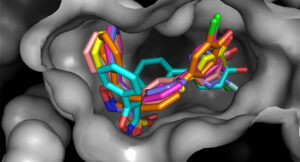Bugs ‘n Drugs: An international student competition tackling antimicrobial resistance
 At the University, our students are driven by a shared passion for global change, inspiring innovative and creative endeavours to shape a better future, together. Our student recruitment teams actively collaborate with international partners to attract the best global talent, enriching our diverse city with invaluable cultural exchange and global perspectives.
At the University, our students are driven by a shared passion for global change, inspiring innovative and creative endeavours to shape a better future, together. Our student recruitment teams actively collaborate with international partners to attract the best global talent, enriching our diverse city with invaluable cultural exchange and global perspectives.
Working with the University’s International Office, the Faculty of Biology, Medicine and Health student recruitment team recently hosted a competition for school pupils (15 – 17 years old) in India. Students were introduced to the topic of antimicrobial resistance (AMR), a phenomenon that causes antibiotics to no longer be effective against infectious microorganisms, reported to be responsible for 1.27 million global deaths in 2019 (WHO, 2023). Students conducted comprehensive research on the topic, before presenting ideas for a compelling public health campaign aimed at raising awareness on the pressing issue.
Titled ‘Bugs and Drugs’, the competition not only engaged young minds on AMR, encouraging collaborative teamwork to devise innovative campaigns, but also provided students an opportunity to develop their transferable skills. The competition was a huge success with submissions from 120 students across several schools in India. Winners received a cash prize of £300, followed by £223 and £150 for 2nd and 3rd place, respectively.
Dr David Allison, Reader in Pharmacy Education at the University and Academic overseeing the competition, said: “All of the presentations were of an extremely high standard, very informative with accurate background information to the topic and provided useful and practical advice to others re what we can all do to help combat antibiotic resistance. The greatest difficulty was deciding on the top three presentations!”
Amongst the impressive submissions, winners, Vipran Vasan and Rohan Sarawate (Team Pathogen Patrol), stood out for their creativity, clarity, and impact. Their presentations outlined how they would target both healthcare professionals and members of the public. Using an array of media and platforms, including a short video, targeted social media campaigns, eye-catching infographics and an informative article, the team aimed to educate individuals about AMR, its harmful consequences and provide practical advice as to how we can collectively promote responsible use.
The campaign also aimed to host a series of educational workshops, co-produced and delivered with healthcare professionals. Initially conducted at the participants’ schools for fellow students, the workshops were to expand into hybrid sessions accessible to the broader community. Students also considered their long-term plan, implementing measures to track and evaluate the reach and effectiveness of the campaign.
David continued: “Antibiotic resistance is a global issue and initiatives such as this bring together people from different countries to collaborate on trying to reduce its impact. Participating students have the opportunity to engage with an International university on aspects of social responsibility that that are key to the university, and at an individual level to develop and acquire key transferable skills such as research, teamworking, presentation and healthcare guidance and advice.”
Find out more:
